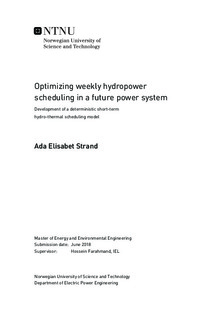Optimizing weekly hydropower scheduling in a future power system - Development of a deterministic short-term hydro-thermal scheduling model
Master thesis
Permanent lenke
http://hdl.handle.net/11250/2560557Utgivelsesdato
2018Metadata
Vis full innførselSamlinger
- Institutt for elkraftteknikk [2474]
Sammendrag
In a future power system with high penetration of intermittent renewable energy sources, it will be necessary to adapt to their changes quickly to ensure system stability. In the European system, the Nordic hydro region could provide some of the necessary flexibility. For this to be possible, models used for hydro scheduling must be adapted to model a system with such variability correctly.
Hence, the object of this thesis is to continue the development of a deterministic short-term hydro-thermal scheduling model, PriMod. The aim is to create a robust model that handles the dynamics of a future power system. PriMod is developed at SINTEF Energy Research and has been made available for research at the Department of Electric Power Engineering at the Norwegian University of Science and Technology (NTNU). An approximating dataset \textit{4del} covering the Norwegian power system with an interconnected thermal area is used for developments and investigations of the model.
The main contributions by the student are the implementation of; transmission ramping constraints, startup and shutdown costs of thermal units, and finally a receding horizon methodology for mixed integer linear programming (MILP).
Suggestions for further development of the model are presented, based on a high-level literature survey as well as case studies completed within the thesis.
The student's work on the model has been documented in BitBucket, to be traceable by future Master's students and Ph.D. candidates as well as researchers at the department, who wish to continue development of the model.
